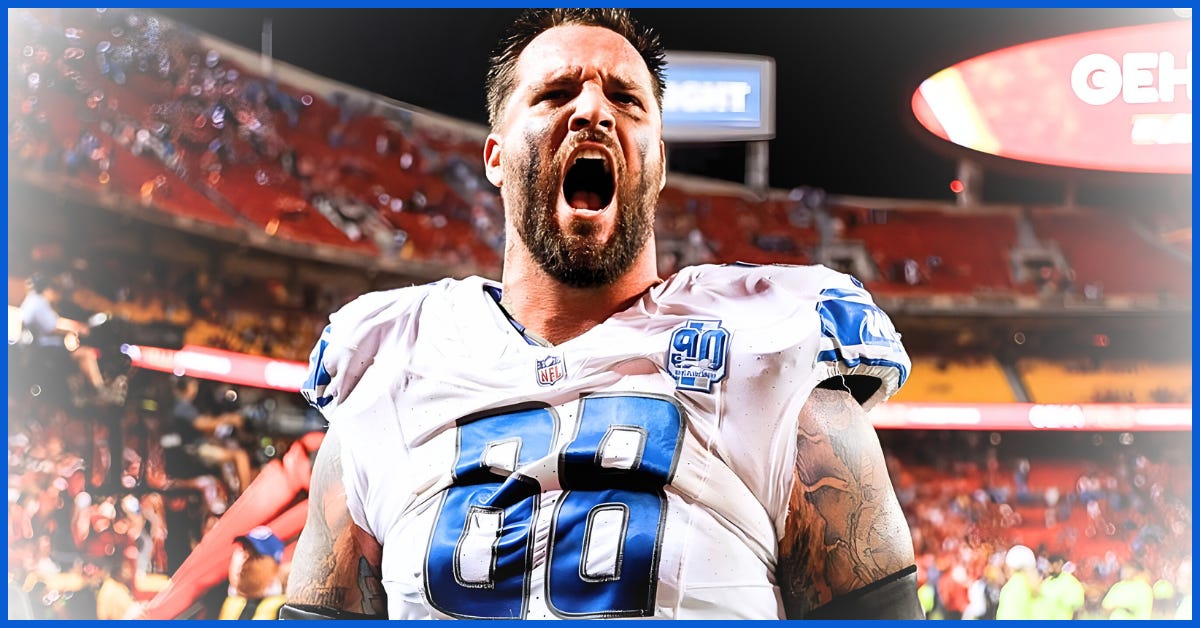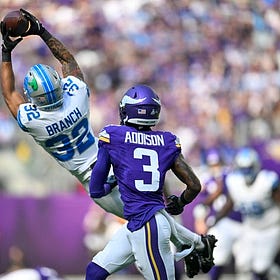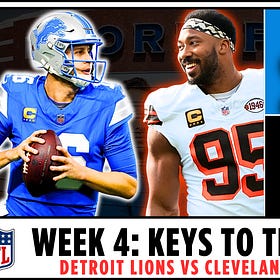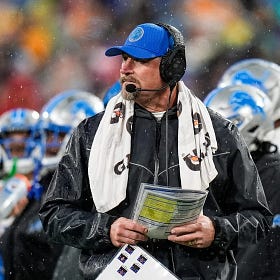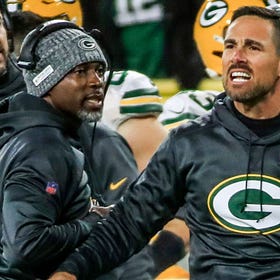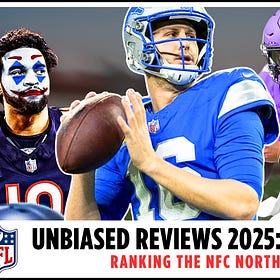Did Brad Holmes Gamble & Lose On Taylor Decker's Extension?
While the Lions have drafted players like Giovanni Manu, there is no proven successor ready to step in
On July 29, 2024, the Detroit Lions announced a three-year, $60 million extension for veteran left tackle Taylor Decker, locking up their longest-tenured player through the 2027 season. The move, which followed a flurry of other key extensions, reaffirmed the front office’s commitment to continuity and their core leadership.
“He’s been a key cog of what we’ve been building, what we’ve been doing...His leadership, his professionalism — he’s a guy that really embraced our culture, so he’s a big part of what we do.” ~Brad Holmes
While the deal secures Detroit’s elite offensive line for the foreseeable future, it also invites scrutiny about investing heavily in a player entering his mid‑30s. Ultimately, the wisdom of the move rests in the contract’s structure, the organization’s commitment to its culture, and the conviction that a proven leader is worth the price.
Lions Fan Spotlight: Week 5
In this week’s Gripes & Hype Mailbag, I was asked to break down Taylor Decker’s contract extension and what it means for the future of the left tackle position in Detroit. Each week, I’ll spotlight one email submission as a featured project—and yes, anonymity is always an option. If your question is selected, you’ll also receive a custom Rocked On Lions Fan Box, courtesy of our friends at 313 Customs.
Mailbag: “I feel the Lions could have done much better here. The future of the position is concerning, Manu doesn’t seem to be the answer, and Brad Holmes gambled himself into a potential disaster. Was this extension to maintain leadership and continuity or was Brad betting on an aging offensive lineman with a loyalty investment instead of going outside the building?” ~Lions Fan
Thank you for the submission “Lions Fan” - I appreciated the email as well and had fun with the project, keep’em coming please! ~Will
My question to all of you before I present the findings. Is Decker’s contract a bargain, a burden, or the perfect balance? Let me know in the comments what you think.
»» Let’s break it down.
Deckers’ Contract Structure & Potential Out
Snapshot
Total Value: $60 million
Length: 3 years (through 2027)
Guarantees: $31.83 million (front‑loaded)
Signing Bonus: $15.74 million
Cap Hits:
2025: $23M
2026: $21M (no guaranteed salary)
2027: $24M (no guaranteed salary)
2028: $3M dead (void year)
Contract Breakdown: Cash Flow
The deal includes $31.83 million in guarantees, with Decker’s 2024 and 2025 salaries fully locked in. Roster bonuses of $1.5 million are scheduled for the fifth day of the 2026 and 2027 league years, serving as team‑controlled triggers. A void year in 2028 spreads bonus money for cap relief, giving Detroit a clean exit ramp. Even the most team‑friendly contracts carry risk, and Decker’s deal is no exception.
If the Lions choose to move on before those dates, they can do so with minimal financial damage. A post‑June 1 release in 2026 would leave just $3 million in dead money while freeing up $19 million in cap space.
Prioritizing cash over cap: General Manager Brad Holmes has consistently emphasized paying core players in cash upfront while pushing larger cap hits into future years. This approach—also evident in extensions for Jared Goff, Amon‑Ra St. Brown, and Penei Sewell—allows Detroit to retain its foundation without sacrificing short‑term flexibility.
Team Benefits: Stability & Flexibility
This wasn’t a “loyalty tax.” It was a calculated investment in protection and continuity—structured with an escape hatch if needed. The extension lowered Decker’s 2024 cap hit by more than $8 million, creating flexibility for other roster moves while keeping the team’s financial options open. By designing the deal this way, Detroit retained one of its core veterans without sacrificing short‑term cap health.
The offensive line remains the engine of the Lions’ offense. Keeping Decker in place preserves chemistry, safeguards Jared Goff’s blind side, and stabilizes the unit that drives both the passing attack and the ground game.
“Having Decker back out there—it’s huge. He’s one of the guys I trust most. He’s seen it all, and he keeps the pocket clean.” ~Jared Goff
Bargain Brad? More Like Honolulu Blue Light Special!
It’s a smart deal when you factor in the rising costs of future extensions at other positions. If the Lions were to release Decker before June 1, 2026, they would have already paid him just over $32.6 million across the 2024 and 2025 seasons, absorbed only $3 million in dead cap, and fulfilled all guaranteed obligations. In return, the team would free up $19 million in 2026 cap space.
A reliable left tackle at under $18 million per year is rare value. By that measure, Decker’s deal places him around 16th among all left tackles in average annual value. The bargain only holds, though, if Decker performs at a top‑15 level. That’s the threshold where cost and production align—and where this extension proves its worth.
On-Field Performance & Durability:
Taylor Decker’s durability and leadership have anchored Detroit’s offensive line for multiple seasons. Since the start of 2022, he has missed only five games. He’s maintained a 92.4% pass block win rate since 2023, ranking seventh among all NFL tackles—just behind teammate Penei Sewell.
Although his 2024 run‑blocking grade dipped slightly, his overall ranking remains consistent with where he finished that season. Decker continues to deliver sub‑elite pass protection paired with above‑average run support. And in his case, the numbers don’t capture the full picture—the film shows his true impact.
2022–2024 Performance (PFF) | 2025 (Min 200 Snaps):
Overall Grade: 76.1 (Top 17) | 2025: 63.6 (22nd)
Pass Block: 77.5 (Top 18) | 2025: 63.1 (26th)
Run Block: 68.9 (Top 22) | 2025: 62.3 (22nd)
Sacks Allowed: 20 | 2025: 1
Pressures: 102 | 2025: 10
Penalties: 17 | 2025: 1
At this point in the season, PFF grades are down across the board for most tackles compared to prior years, and Decker’s numbers fall in line with that trend. But grades alone don’t capture a player’s true value. They’re a data point, not a definitive measure of performance. When you factor in the level of competition, there isn’t another left tackle playing at Decker’s level against this type of schedule who wasn’t acquired with a first‑round pick or at a much higher cost. To fairly evaluate his impact, you have to consider the full context: strength of schedule, health, the performance of the entire offensive line, and even play‑calling.
Unexpected Performance? Decker Doesn’t Think So!
In Week 4 of the 2025 season, Taylor Decker faced one of the NFL’s toughest assignments: Cleveland’s defensive front led by Myles Garrett. Despite managing a nagging shoulder injury, Decker turned in a strong performance, surrendering just one quarterback hit and three hurries, with no sacks allowed. Performances like this are beginning to validate Detroit’s decision to extend him. Through the first four games of 2025, Decker has logged over 240 snaps, allowing only one sack and 10 total pressures.
“I think I’m playing well, but the frustrating thing for me is I think I could play better if I felt better,” “The performances have been pretty good, but the frustrating thing is I have my own personal standards, and when you’re not at 100 percent it’s hard to meet those. But that’s why you still go out there and do your best for the team. I feel like if I’m out there, I give us a chance to win.”
“I was impressed man. Decker’s been laying it on the line for us, and we know he’s not 100 percent so it’s taking everything to get him back to those games ready to compete…” “Deck’s a warrior. He’s playing through stuff most guys would sit out with. His presence settles the line and gives Goff the confidence to stay in rhythm.” ~Dan Campbell
ROCKED ON DETROIT LIONS PODCAST
You Made The Argument
Age Curve Concerns: Decker’s extension covers his age‑31 through age‑34 seasons. While he hasn’t shown significant decline yet, offensive tackles often lose mobility and recovery speed in their early 30s. If that happens, the Lions could end up paying top‑16 money for production that ranks in the bottom third of starters.
Injury Risk: His recent injury management adds to the concern. Investing heavily in an aging lineman always carries the risk of declining play and missed time.
No long-term successor: While the Lions have drafted players like Giovanni Manu, there is no proven successor ready to step in. If Decker’s performance drops suddenly, the transition could be disruptive to the offensive line’s stability.
Opportunity cost: Every dollar committed to Decker is a dollar not available for other priorities. Overpaying him could limit Detroit’s ability to extend younger stars such as Jahmyr Gibbs, Jack Campbell, Sam LaPorta, or Brian Branch.
My Rebuttal
Age & Injury Concerns: While his availability has been excellent recently, the 2021 finger injury that cost him eight games is a reminder that one bad break — literally — can derail even the most durable careers. The Lions structured this deal with clear exit points. If Decker’s play declines due to age or injury, Detroit can move on without absorbing a crippling cap hit. That flexibility protects the team from a long‑term overpay.
Securing The Core & Succession Plan: The extension keeps the league’s best offensive line intact during the team’s Super Bowl window. Finding a left tackle of Decker’s caliber for less money is unrealistic unless you draft and develop one. It’s likely the Lions will target a tackle in the 2026 draft, giving them a natural succession plan. Ideally, Decker retires in Detroit—possibly with a ring.
Rewards A Culture-Setter: Decker embodies the Lions’ transformation from perennial underachiever to contender. If BRad & Dan did reward Decker’s loyalty, this sends a clear message: hard work and commitment are valued here. Beyond his play, he’s been a steady mentor and leader, setting the tone for younger teammates.
The Future Extensions: Brad Holmes made a calculated move. The contract pushes heavier financial costs into future years, when the salary cap is projected to rise. This structure ensures Decker’s deal won’t jeopardize extensions for the 2022 and 2023 draft classes. And if needed, Detroit can walk away after 2025 with minimal damage. That’s not a mistake—it’s leverage.
Rock’s Final Take
The Taylor Decker extension is emblematic of the Brad Holmes–Dan Campbell era: a calculated bet on continuity, culture, and veteran leadership. The financial commitment and Decker’s advancing age carry real risks, but the deal underscores Detroit’s philosophy of rewarding its own and trusting the players who helped build its foundation. By structuring the contract with built‑in flexibility, the Lions safeguarded their future while sending a clear message to the locker room: buy in, perform, and you’ll be rewarded. Whether Decker’s on‑field production continues to match the investment remains to be seen, but for now, Detroit is banking on the steady leadership of its longest‑tenured player.
Sources Used In Today’s Spotlight
DSN – Brad Holmes on Decker’s extension
MSN – Dan Campbell on Decker’s toughness
AtoZ – Campbell on veteran walkthroughs
Lions.com – Official contract announcement
DSN – Decker on loyalty and career
MSN – Decker on playing through pain
Lions.com – Jared Goff on Decker’s impact
Join The Detroit Football Journal Daily Podcasts Below
LATEST STORIES
Deep Dive: Coaching Strategy Breakdown for Matt LaFleur Ahead of Week 1
Matt LaFleur enters the 2025 season with a reputation for precision and poise. While Dan Campbell commands headlines with his aggressive fourth-down calls, LaFleur operates with a quieter intensity—his playbook built on motion, misdirection, and rhythm. Since taking over in Green Bay, he’s led the Packers to multiple playoff appearances and crafted one of the league’s most efficient offenses, even amid roster turnover and quarterback transitions.
The NFC North's Top Ranked Quarterback Is Once Again Jared Goff - It's Not Close
Every season Rocked On Sports Media performs an unbiased review for all positional groups within the NFC North. Grading, analyzing and ranking each positional group from one (1) being the best, and four (4) being the worst.



